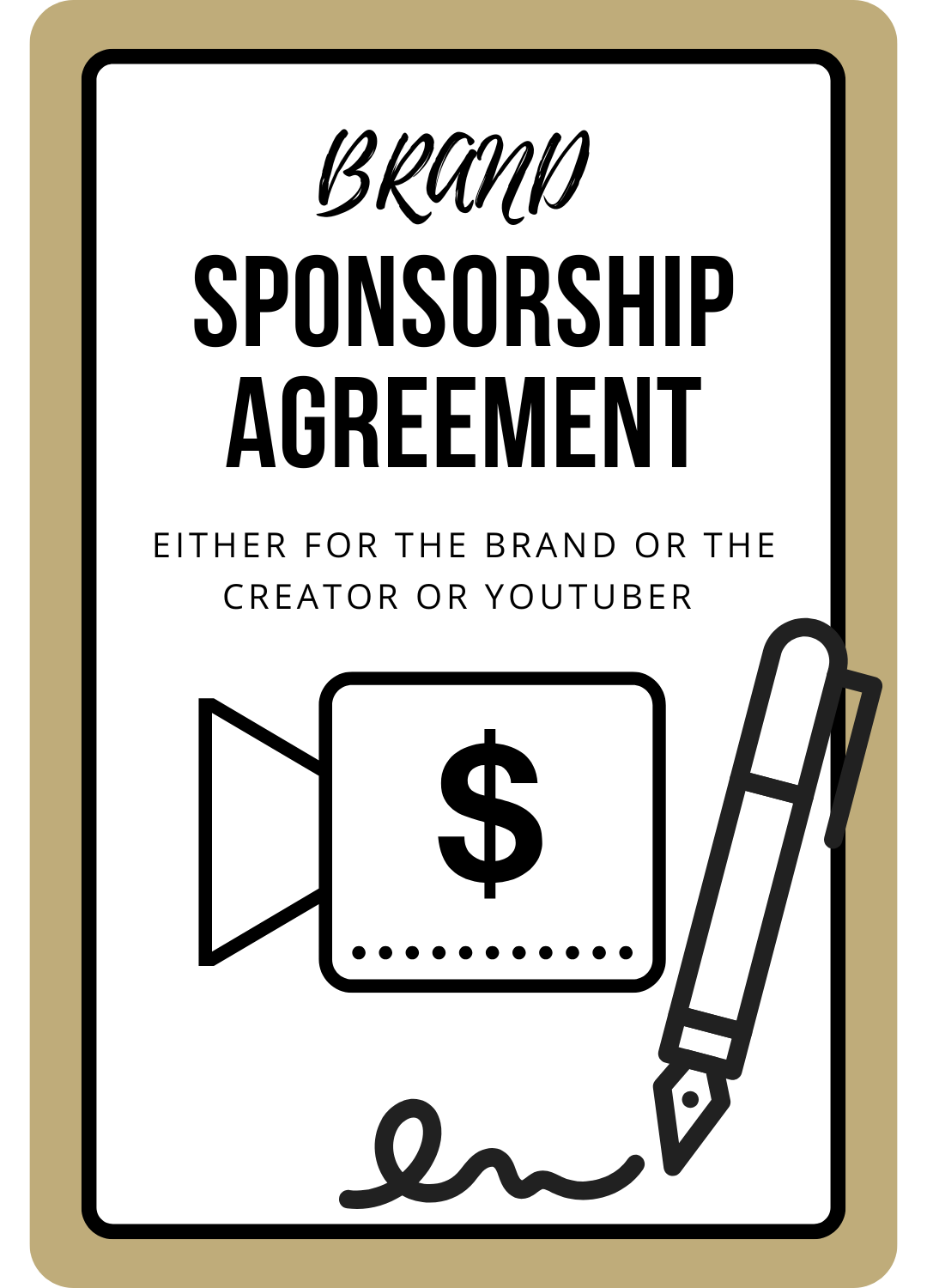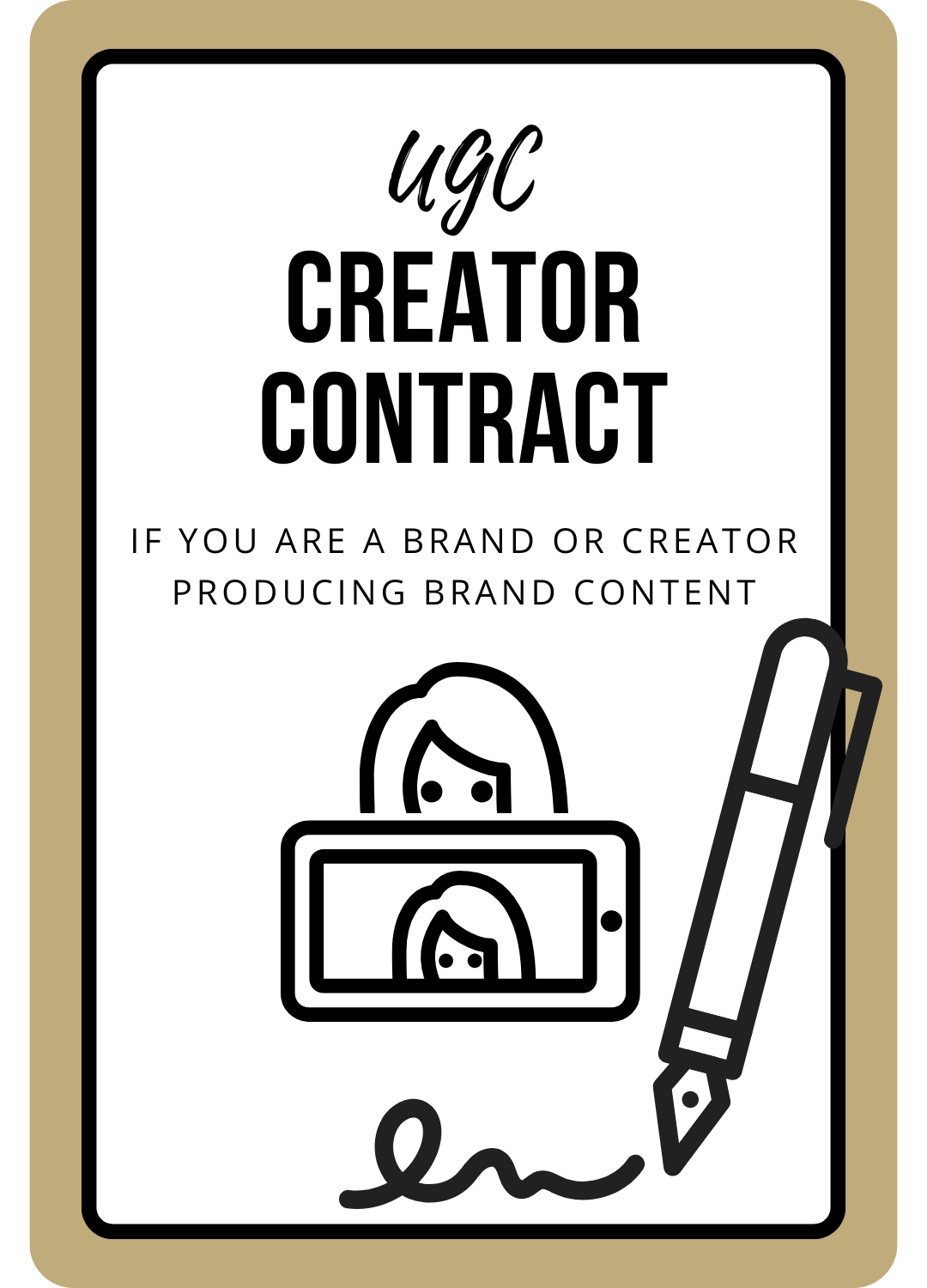9 Key Terms Every Content Creator Contract Must Include (UGC & Influencer Agreements Explained)
Looking for a content creator contract you can actually use? Before you sign anything, there’s something important you need to know.
A content creator contract can mean two completely different things:
👉 A UGC contract → you create photos or videos for a brand to use on their platforms.
👉 An influencer contract → you post content on your own platforms to promote a brand.
And here’s the problem: a lot of templates online claim they can be used for both. They can’t. The terms you need for each deal are completely different — and using the wrong content creator contract could cost you money, ownership, or creative control.
As a lawyer who works with creators every day, I’ve seen this mistake far too often. That’s why I designed an influencer contract template and a separate content creator contract template for UGC creators — so you’ll always have the right protection in place.
In this post, I’ll break down the 9 key terms every content creator contract must have and explain exactly how each one applies in a UGC deal vs an influencer deal. By the end, you’ll know what to look for, what to negotiate, and how to protect your rights without leaving money on the table.
This post is all about the key terms every content creator contract must have — and how they apply differently in UGC vs influencer deals.
Best Content Creator Contract for Influencers & UGC
9 Key Terms: UGC Content Creator Template VS Influencer Contract Template
1. Scope of Work & Deliverables
Your content creator contract should always start by locking down what exactly you’re delivering. Without this, brands can ask for unlimited extras or reject your work because it “wasn’t what they expected.”
For UGC contracts:
My UGC Content Creator Contract ties into the deliverables and your UGC rate card, and lists:
The type of deliverables (Reels, TikToks, YouTube Shorts, photos, etc.).
The number of drafts and revision rounds included.
Add-ons specific to UGC deals, like raw files, extra hooks/CTAs, additional usage rights, etc.
What’s not included (extra edits, written copy, resizing, copying another creator’s style, etc.).
This keeps the project clear and stops brands from sneaking in unpaid extras.
For influencer contracts:
My Influencer Contract Template ties scope directly to the deliverables in the brief and your influencer rate card. It spells out:
Whether posts are integrated mentions or dedicated sponsored content.
Exact platforms, post types, and duration (e.g., Reel, carousel, Story, YouTube integration).
Add-ons specific to influencer deals, like exclusivity periods, whitelisting, or a link in bio.
What’s not included — like unlimited edits, guarantees on results, or copying another influencer’s style — so your boundaries are crystal clear.
👉 That’s why my templates don’t just say “deliver X content.” They give you a checklist-style system to define everything upfront, protect your time, and avoid scope creep.
2. Approvals & Retakes
Feedback and edits can easily spiral out of control if your content creator contract isn’t clear. Without limits, brands may expect unlimited retakes or drag their feet on approvals — leaving you stuck in limbo.
For UGC contracts:
My UGC Content Creator Contract makes this airtight by:
Defining the number of drafts and revision rounds included.
Setting a firm feedback window — if the brand doesn’t respond in time, the draft is deemed approved.
Charging for extra revisions outside the agreed scope.
Requiring that, once approved (or deemed approved), you deliver the final files to the brand within a set number of days.
That way, you’re never waiting endlessly for feedback, and the brand knows exactly when to expect the finished content.
For influencer contracts:
My Influencer Contract Template takes a different approach, because delivery isn’t about sending files — it’s about when you publish on your own channels.
Revision rounds are still limited and tied to the agreed scope.
Content is deemed approved if the brand doesn’t respond within the deadline.
Once (deemed) approved, you post the final content at the agreed dates and times on your platforms (Instagram, TikTok, YouTube, etc.).
👉 That’s the key difference: UGC = handover of files to the brand. Influencer = live posting on your own account.
3. Deadlines
Deadlines aren’t just about when you finish creating content — they’re about when the brand gets to use it (in the case of UGC) or when you need to post it (in the case of influencer deals). If this isn’t spelled out, you could end up with endless delays or pressure to rush without extra pay.
For UGC contracts:
In my UGC Content Creator Contract, the timeline is tied to the approval process.
You provide the first draft within a set number of business days after the project starts.
The brand must give feedback within a set timeframe — or the draft is automatically deemed approved.
Once approved (or deemed approved), you deliver the final files within a specific number of days.
This ensures the brand can’t stall the project, and you’re not left wondering when (or if) you’ll get paid.
For influencer contracts:
With influencer deals, deadlines are about campaign schedules and posting dates — not file transfers.
My Influencer Contract Template requires that you publish the approved content on your own channels at the agreed dates and times.
It also covers things like story expirations (e.g., 24 hours vs saving to highlights) and minimum posting periods (how long a Reel or YouTube video must stay live).
If a brand wants to move up or push back posting dates, that has to be agreed in writing.
👉 My templates reflect that distinction between the different processes for UGC and influencer deals, so you never miss a deadline — or end up on the hook for obligations you didn’t agree to.
4. Payment & Refund Policy
If payment terms aren’t crystal clear, you risk chasing invoices or losing money if a deal falls through. That’s why your content creator contract should spell out when you get paid, how much, and what happens if the project is canceled.
For UGC contracts:
In my UGC Content Creator Contract Template, payments are structured around deliverables and approvals.
You’re entitled to a deposit before you even start.
The balance is due upon delivery of the final files (or within a set number of days after delivery).
The contract can also include royalties or recurring usage fees if the brand wants to keep using your content for ads or beyond the original license period.
If the brand cancels mid-project, you’re still paid proportionally for drafts, revisions, or work already completed.
This ensures you’re never left unpaid for time you’ve already invested.
For influencer contracts:
My Influencer Contract Template ties payments to posting obligations and campaign extras.
A non-refundable deposit secures the collaboration.
The remaining balance is due either before posting or within a set number of days after you publish the content.
Add-ons like exclusivity, whitelisting, or influencer usage rights are billed separately — and often monthly.
You can also build in success fees (e.g., bonuses tied to sales or conversions) and commissions.
If the brand cancels, the contract specifies how much of the fixed fee is still owed, depending on the stage of the campaign.
👉 In short: UGC payments follow the content creation timeline, while influencer payments follow the posting timeline. Both of my templates protect you with deposits, clear due dates, and refund policies that stop brands from pulling out without paying you fairly.
5. Exclusivity & Conflicts of Interest
Exclusivity can be a tricky topic. If it’s not spelled out, brands may assume you can’t work with their competitors — even when that wasn’t part of the deal.
For UGC contracts:
My UGC Content Creator Contract Template is clear: UGC creators aren’t influencers. You’re hired to produce content, not lend your audience. That means exclusivity is unreasonable.
The contract does not restrict you from working with other brands in the same industry.
It does, however, protect the brand by stating you can’t reuse the exact same deliverables for competitors.
For influencer contracts:
Exclusivity is much more common because the brand is paying for your audience’s trust. My Influencer Contract Template makes sure:
Exclusivity is strictly limited to the product category or industry agreed.
It only lasts for a defined period (e.g., 30 or 60 days) — not forever.
If the brand wants a longer or broader restriction, it must be reflected in the fees (so you’re compensated for lost opportunities).
👉 The difference is simple: UGC = no exclusivity. Influencer = exclusivity only with limits and extra pay. My templates draw that line for you so you never give away your freedom to work with other brands for free.
💡 Need a Contract That Covers All This?
Don’t risk using a generic “one-size-fits-all” content creator contract template. My contracts are written specifically for creators — with separate versions for UGC and influencer deals.
Here’s what you’ll get inside each template:
✅ Clear deliverables & scope (so brands can’t sneak in extras)
✅ Approval & revision limits (with automatic approval deadlines)
✅ Payment protection (deposits, due dates, cancellation terms)
✅ Usage rights & exclusivity clauses tailored to your type of deal
✅ Creator-friendly language you can actually understand
👉 Choose the right one for you:
Protect your work, your payments, and your freedom to collaborate with brands — without paying a lawyer thousands.
6. Copyright Ownership & Usage Rights
One of the biggest mistakes creators make is signing away their rights without understanding what it means. Your content creator contract must be clear on who owns the content and how it can be used.
For UGC contracts:
My UGC Content Creator Contract Template makes the distinction between ownership and licensing.
By default, you own the rights to the deliverables.
You can either assign ownership (transfer rights to the brand) or license usage rights (you stay the owner, but grant them limited permission to use the content).
Usage rights are tightly defined:
Where the brand can post the content (TikTok, Instagram, website, email, etc.).
Whether it’s for organic use only or also for paid ads.
How long the usage rights last.
Importantly, the contract allows you to charge additional fees for extended usage, ad rights, or a full transfer of ownership.
This ensures the brand can’t just take your work and use it everywhere forever — unless you’re paid fairly for it.
For influencer contracts:
My Influencer Contract Template also keeps you protected, but the focus is different:
Since you post the content on your own channels, you retain ownership of it.
The brand only gets limited influencer usage rights — for example, to repost your content on their account (if they pay for it).
If the brand wants to use your content in ads or run whitelisting campaigns through your handle, that requires separate paid usage rights spelled out in the contract.
👉 Want these protections built in? Get my UGC Content Creator Contract Template or Influencer Contract Template and stop giving away your content for free.
7. Confidentiality & Non-Disparagement
Working with brands means you’ll often get access to private information — and both sides want to keep their reputations intact. That’s why your content creator contract should include confidentiality and non-disparagement terms.
For UGC contracts:
My UGC Content Creator Contract Template protects both parties by requiring:
Confidentiality → You can’t share campaign briefs, unreleased product details, or sensitive business information.
Respectful communication → Disputes must be handled privately, not blasted on social media.
Non-disparagement → You won’t publicly badmouth the brand, and they won’t trash your professionalism either.
This way, you’re free to work with multiple brands without one collaboration damaging another.
For influencer contracts:
My Influencer Contract Template goes a step further because reputation is everything in sponsorship deals.
You agree not to make negative public statements about the brand.
The brand agrees not to make negative public statements about you or your work.
Confidentiality extends to payment terms, campaign performance, and negotiation details, so brands can’t undercut your rates elsewhere.
👉 In short: UGC = protect the project. Influencer = protect your public image. My templates give you both, so you can focus on creating content without worrying about your reputation being undermined.
8. Liability & Indemnities
Liability clauses decide who takes the blame when things go wrong. And without ironclad disclaimers and indemnities in your content creator contract, brands may try to hold you responsible for things far beyond your control.
For UGC contracts:
My UGC Content Creator Contract Template makes it clear:
Once you’ve delivered the content, you’re not on the hook for how the brand uses it.
The Content Schedule Disclaimer protects you if the brand delays posting or misses campaign deadlines.
You’re also indemnified if third parties make claims (like copyright issues with brand-supplied materials).
For influencer contracts:
My Influencer Contract Template protects you as the one speaking to your audience:
The Authenticity Disclaimer guarantees you can post honestly — without parroting exaggerated brand claims.
If your audience interprets things differently, or the brand’s goals aren’t met, that’s not your liability.
The brand also indemnifies you if regulators or platforms challenge claims they required you to make.
👉 In short: UGC = you’re protected as a producer. Influencer = you’re protected as a promoter. Either way, my templates cap your liability and shift risks back where they belong — on the brand.
9. Termination & Cancellations
Cancellations happen — but without clear terms, you risk losing both your work and your payment. That’s why your content creator contract needs to spell out who can end the deal, when, and what compensation is owed.
For UGC contracts:
My UGC Content Creator Contract Template protects you by stating:
✅ You keep part (or all) of the fee if the brand cancels mid-project.
✅ Any extra drafts, revisions, or services completed must still be paid for.
✅ If payment isn’t made, you can revoke the brand’s right to use your content.
For influencer contracts:
My Influencer Contract Template balances both sides, with creator-friendly safeguards:
✅ You still get paid for work already completed, even if the brand cancels the campaign.
✅ Posting deadlines, minimum live times, and cancellation fees are defined up front.
✅ You have the right to terminate if the brand’s reputation changes (e.g., a scandal or controversy) that could harm your own image.
👉 Bottom line: UGC = you’re covered for drafts and deliverables. Influencer = you’re covered for posts and your reputation. My templates make sure cancellations don’t leave you unpaid — or tied to a brand that could damage your credibility.
The Best Content Creator Contract Template for You
Whether you’re creating UGC for a brand’s platforms or posting sponsored content to your own audience, one thing is clear: you can’t rely on generic “one-size-fits-all” content creator contracts.
The terms that protect you as a UGC creator — like file delivery deadlines and revoking rights if payment isn’t made — are completely different from the terms that protect you as an influencer — like authenticity clauses and the right to walk away if a brand damages your reputation.
That’s why I created two separate, creator-friendly templates:
📸 UGC Content Creator Contract Template → Covers deliverables, approvals, deadlines, usage rights, and liability protections specific to content-for-hire deals.
🎥 Influencer Contract Template → Covers posting requirements, exclusivity, usage rights, authenticity, reputation protection, and more.
Need more than just one content creator contract? You can also grab the full bundles:
⭐ UGC Contract Bundle → Includes the UGC Creator Contract plus other must-have agreements for content creators.
⭐ Influencer Contract Bundle → Includes the Influencer Sponsorship Agreement plus additional contracts to protect your brand deals.
👉 Don’t wait until a brand dispute costs you time, money, or credibility. Get the content creator contract template that actually fits the work you do.
This post was all about the 9 key terms every content creator contract must include — and how they differ for UGC vs influencer deals.
Learn more about the contracts you need here:











